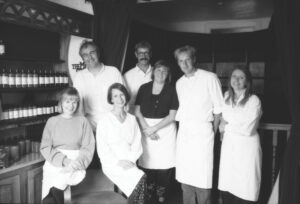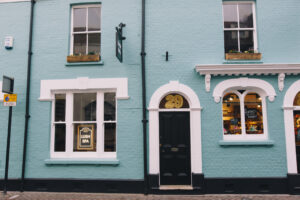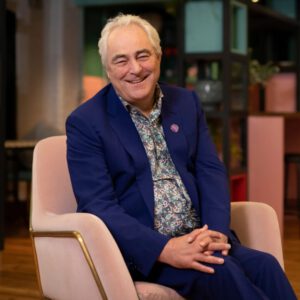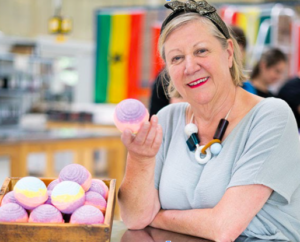
Hello gorgeous… welcome to the wonderful world of Lush

In the beginning…
Lush was founded in 1995 by six co-founders; Mo Constantine, Mark Constantine, Rowena Bird, Helen Ambrosen, Liz Bennett and Paul Greeves.
Emerging from the demise of a previous mail order business called Cosmetics To Go – a massive success that collapsed through a combination of over-trading and flooding – it was the same team that created and inspired this new venture called Lush.
Lush is 10% Employee Owned and our people are the heart and soul of our business…
Meet the Founders
/ 6+ years of Lush
By Mark Constantine
All companies need a vision. Although we didn’t really understand it, the Lush founders did have a vision. We believed you wanted effective products. Natural (although who knew exactly what that meant), fresh (and by that we were throwing shade at our competitors who were selling sterile, stale chemical concoctions that were three years old), and we didn’t want to spend more money on the packaging than on the contents. So, above all, we believed you wanted good value products, not cheap, but loads of hair and body goodness for your money.
Hindsight is great and it’s only looking back now that we realise our vision was just a dissatisfied reaction to our competitors’ products: a wish for something more wholesome and more in tune with the flowers and the bees than air-conditioned skyscrapers and a morning that starts with a pumpkin spice latte.
When faced with life’s challenges, we often discover that while we may want a lot of things, what we need is very simple. We thought that while our products weren’t everything you, the customer, wanted – age-reducing, silicone, shiny, botoxy sort of stuff – we can now see that what we make is all you need.
So, where are we now? Let’s reassess.
Natural – have we got there yet? No, but we’re not far off. In the financial year of 2017 to 2018, natural ingredients represented 65% of our global raw material spend compared to 35% spent on safe synthetic materials. When I first sold my products with Liz Weir in 1977, I used to get told off for them being too natural, yet they were miles off from where they are today…
How we’ve grown
How many of you have unused products sitting in your bathrooms? Because when you got home you found that product isn’t what you hoped for, or it doesn’t suit your skin, hair or lifestyle. You end up with bathroom cabinets, window sills and shelves full of unwanted stuff, on its way to landfill. When we make products for every need, everyone is able to buy exactly what’s required and ultimately reduce waste.
Providing personal service is the best environmental practice. If we can get you connected to the appropriate product for your needs, you get really good value for money, we get a regular customer, the consumption of unneeded product falls and money is no longer wasted. When you think about the product people really want, they want products to be made from rainbows, unicorns and waterfalls and we’ve got it!
Our raw materials are the best they can be. As just one example, we’re using salt in our products with genuine benefits, and we’re sourcing it from the flight paths of birds. One of our suppliers, Antonio, both harvests our saltworks and works to protect and sustain the salt marshes of the western Algarve in Portugal. Birds including greater flamingos, spoonbills, black-winged stilts and many species of ducks use the salt marshes as wintering grounds while whimbrels and curlews rely on the site as a resting place on their migratory journeys.
Preserving this beautiful and important coastline is essential to the wildlife flourishing here and the generations of salt shepherds to come, so we’re protecting those birds and the salt shepherds.

What we do is not rocket science; humans have been preening and grooming forever. But in recent years many formulae have become synthetic, complicated, over emulsified and most of all over preserved. All of our lives we’ve been working hard to remove preservatives from your products, without compromising on effect. We’ve worked on it and worked on it until we’re experts and still a few people complain about parabens. When we can’t remove the preservatives, we have to look for the safest and most researched option. We use parabens because all of the other preservatives available don’t have the research parabens have.
Preservatives have to be poison, it’s their nature, but we have learnt that we don’t need to preserve anything AT ALL. That’s where we’re going.
From 2015 to 2017, our purchase of parabens has dropped from 11.7 tonnes annually to 7.7 tonnes, even though our sales have increased in the same time period. Why are our sales increasing while our use of preservatives decreases? Because our customers are kind enough to buy the naked, or self-preserving version.
None of these amazing ingredients are tested on animals. Since the beginning, we have continuously proved that a brand doesn’t need to test on animals. The Lush Prize launched in 2011 and we’ve had 93 winners and awarded £1.86 million towards alternatives to animal testing. So far, the USA has had the highest number of Lush Prize winners.
If Lush can do it, why can’t everybody else? When I think back to animal testing, what seemed like a sensible idea in my bedroom all those years ago [banning it], has turned into legislation banning animal tests for cosmetics in 40 countries. We have fought for an end to animal testing for years, from trying to deposit two tonnes of animal manure on the doorstep of the EU to losing our Regent Street shop expressly because the landlords didn’t like three million viewers watching the people-testing video filmed in that shop window. We continue to fight animal testing now.
Then there is the giving. You soon got the hang of Knot Wrap. Since 2009, we have sold (and consequently upcycled) 47 tonnes of beautiful scarves. That’s not even taking into account the 124 women who have found employment with re-wrap making our canvas bags.
In the last five years, we have raised and given £50 million and last year alone we funded 3,500 groups.
So, what’s next?
Working on your aspirations is a challenge. Lush has been working hard for a long time, so it can be tricky to think about what we can do next. This has been playing on my mind ever since a journalist recently asked me just how much more creativity we can have left after 25 years. The answer is: it’s everywhere. Lush is oozing with creativity, sometimes I even find it hard to contain; it’s fantastic.
For many years I haven’t written a plan for Lush. I think the last time we had a cohesive plan was back in 2013; it was a good plan and it lasted us quite a long time. Each year we kept trying to renew it, but we never did. This year, I wanted to write a new plan. So here it is, on the internet for all to see.
The Secret Lush Cosmetics Master Plan
1. Make products for every need. It’s not what customers want, it’s what they need.
2. Be number one in every category. Do not accept the status quo: invent new products that fulfil all of the vision.
3. Create a cosmetic revolution to save the planet. We’re running out of time – we need a revolution.
In the latest WWD Beauty top 100, L’Oréal is number 1 and we are number 33. That means we’re 3.8% of L’Oréal. For 25 years, we have made great products, with beautiful ingredients, we’re transparent with our customers and we don’t sell them fake benefits. It’s a real puzzler why we’re not the number one cosmetics company. For the sake of the environment, we NEED to be number one.
The thing is, there is a group of us reaching the pinnacle of our careers and we’re in sight of what we wanted to do all our lives. We wanted no preservatives, we wanted no packaging, and bit by bit we’ve worked towards doing it.
We should be the gleaming example that every other cosmetics company wants to be, it shouldn’t be Proctor and Gamble or L’Oréal, because Lush is doing the right things over and over again. Fiercely, bravely, sometimes foolishly, and with courage.
Further reading →
12:11





